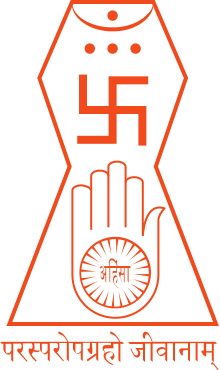Micchami Dukkadam
| Part of a series on |
| Jainism |
|---|
 |
|
Jain prayers |
|
Ethics |
|
Major figures |
|
Major sects |
|
Festivals |
|
Pilgrimages |
|
|
Micchāmi Dukkaḍaṃ is an ancient Indian phrase, which is translated from Prakrit to literally mean "may all the evil that has been done be fruitless." [1] It is commonly used to seek forgiveness and to mean, "If I have offended you in any way, knowingly or unknowingly, in thought, word or deed, then I seek your forgiveness."[2]
It is used widely in the Jain religion on the last day (Samvatsari or Kshamavani) of Paryushana, the most important annual holy event of the Jain calendar.[3][4] As a matter of ritual, Jains greet their friends and relatives on this last day with Micchāmi Dukkaḍaṃ, seeking their forgiveness. No private quarrel or dispute should be carried beyond this time. The importance of forgiveness in Jainism may be compared to the importance of forgiveness in other religions.
The phrase is also used by Jains throughout the year when a person makes a mistake, or recollects making one in everyday life, or when asking for forgiveness in advance for inadvertent ones.[5]
Complete Micchāmi Dukkaḍaṃ meaning by shloka
| khāmemi savva jīve | I forgive all living beings. |
| savve jīvā khamaṃtu me | May all souls forgive me, |
| mittī me savva-bhūesu | I am on friendly terms with all, |
| veraṃ majjha na keṇa:i | I have no animosity toward any soul. |
| micchāmi dukkaḍaṃ | May all my faults be dissolved. |
Practice
micchāmi dukkaḍaṃ is most commonly used on the last day (Samvatsari) of one of the most holy annual Jain events, Paryushana. After pratikramana (Jain prayer, literally meaning "introspection"), Jains seek forgiveness from almost all the creatures of the world whom they may have harmed knowingly or unknowingly by uttering the phrase—micchāmi mukkaḍaṃ.[2][6]
Paryushana frequently falls in August or September during Cāturmāsa, four months into the rainy season. This annual holy time for Jains is reserved for prayers, meditation, introspection, penance, and fasting. Even the wandering monks temporarily abandon their wandering life and settle down amidst laymen, giving discourses and organizing scriptural recitations.[4]
Traditionally, letters were sent and telephone calls made to friends and relatives asking their forgiveness.[7]
Etymology
The phrase michchāmi dukkaḍaṃ is also found in the Airyapathiki Sutra.[4] It literally means — may all the evil that has been done be fruitless, and comes from the Prakrit language, a middle Indo-Aryan language, closely linked with Pali and used abundantly in the Prakrit canon of Jainism.[1]
The Sanskrit version(chayā) of the phrase is mithyā me duṣkṛitām meaning "may the evil of it be in vain".[4] or simply put "May my misdeeds be undone."
mithyā refers to 'being fruitless' or 'getting absolved of'. me refers to 'my'. duṣkṛitām refers to 'bad deeds'.
See also
References
- 1 2 Chapple. C.K. (2006) Jainism and Ecology: Nonviolence in the Web of Life Delhi:Motilal Banarasidas Publ. ISBN 978-81-208-2045-6 p.46
- 1 2 Preeti Srivastav (2008-08-31). "Request for Forgiveness". Indian Express. Retrieved 2009-11-11.
- ↑ "Jains pray for peace, brotherhood". The Hindu. 2007-09-13. Retrieved 2009-11-11.
- 1 2 3 4 R. Williams (1991). Jaina yoga: a survey of the mediaeval śrāvakācāras. Motilal Banarsidass Publ. p. 205. ISBN 81-208-0775-8.
- ↑ M.R.P. Vijaya; K.C. Jani (1951). Śramana Bhagavān Mahāvira: pt. 1. Sthavirāvali. Śri Jaina Siddhanta Society. p. 120.
- ↑ Natubhai Shah (1998). Jainism: the world of conquerors, (Vol. 1). Sussex Academic Press. p. 212. ISBN 1-898723-30-3.
- ↑ Hastings, James (2003), Encyclopedia of Religion and Ethics Part 10, Kessinger Publishing ISBN 978-0-7661-3682-3 p.876